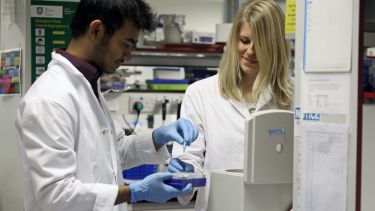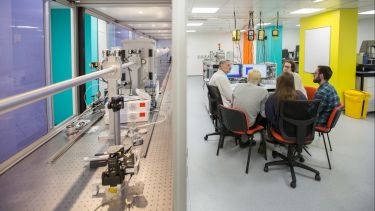Explore this course:
Applications for 2024 entry are now open. Apply now or register your interest to hear about postgraduate study and events at the University of Sheffield.
Drug Discovery Science
Department of Chemistry,
Faculty of Science

Course description
This course covers the drug discovery and design techniques used in the pharmaceutical industry. You’ll study topics such as pharmacology, toxicology and genomics as you learn how target molecules to treat specific diseases are identified, characterised and optimised for potential clinical trials.
Your training will cover the fundamental chemistry and biology of protein interactions, their role in disease and how drugs affect the human body. You’ll learn about computer-aided drug design techniques that are used to predict how well a potential drug might work and screening technologies that are used to test a drug’s effect on its molecular targets.
The course is taught by world-leading scientists from across chemistry, biology, engineering and medicine and gives you access to state-of-the-art screening and analysis facilities.

Modules
Core modules:
- Laboratory Practice and Statistics
-
The module covers techniques and analytical methods commonly used by most researchers in human molecular biology. Students learn the importance of experimental design and application of statistical methods for power and significance calculations for different types of experiment. In group work, students design a poster to present a set of data. In practical laboratory classes, students are shown how to perform a series of techniques that are frequently used in molecular biology, analyse their data statistically and present results in a formal laboratory notebook.
15 credits - Research, Presentation and Professional Skills
-
This module aims to prepare students to become professional scientific researchers ready to conduct a research project. Students will be taught how to retrieve and critically assess the existing literature on a particular research topic and to communicate this as a scientific review. They will learn about the attributes of an ethical researcher, scientific method and how to undertake research safely and responsibly and how to manage data. In addition, students will acquire professional skills relevant to their future employability and learn how to present scientific information. Students will undertake a training needs analysis supported by an experienced researcher so that they can take charge of their own development. This will allow them to tailor their subsequent training to the project they are about to undertake and to their wider individual professional and researcher development. On completion of the module students will have produced a portfolio of work that will form the foundations of their training as a professional researcher.
30 credits - Drug Design, Pharmacology & Medicinal Chemistry
-
This module will provide an in-depth discussion of relevant disease mechanisms and strategies that can be used to optimise the pharmacodynamic, pharmacokinetic properties of drugs; and how drugs/analogues can be designed using computer-aided drug design (CADD) software.
30 credits - Drug Discovery Research Project
-
For this module, students complete an extended and independent research project working as a member of a team to solve a problem at the cutting edge of drug discovery. They receive specialist training to help them develop the advanced practical skills they need for their project, and have access to state-of-the-art equipment and facilities. They also put their previous research training and transferable skills into practice through literature searches, communicating their work and presenting their findings
60 credits
Optional modules - two or three from:
- The Biotech and Pharmaceutical Industry
-
This lecture module will be taught by professionals from a wide range of companies in the drug industry and from the business services team here at the University of Sheffield. The course will teach students the major steps in the drug discovery process including; screening, development, testing, small molecule manufacture, venture capital funding, patent law, the growing field of contract research and the roles each company has within this industry. Students will learn directly from specialists within these fields. From the Sheffield business team, the students will learn how new ventures are started from University and the process of generating new spin out companies.
15 credits - Neurodevelopment and Behaviour
-
This course examines the mechanisms that underlie development of the nervous system during embryogenesis. Examples will be described from a variety of model organisms to introduce key steps in the establishment of the CNS and PNS, steps that include neural induction, neural patterning, early segregation of CNS and PNS, the establishment and refinement of connectivity in the nervous system. Recent research from teachers of this course, and from both the classical and current literature is used to analyse and evaluate theories and mechanisms of establishment of the functional nervous system.
15 credits - AMR and Current Clinical Practice
-
In this module we will examine current clinical practice in relation to antimicrobial resistant infection, both in the UK and globally. We will discuss why it is a problem now and the implications for the future. We will describe how resistance arises and compare and contrast different antimicrobial resistant infections. We will study the different aspects of clinical practice, examining case studies and the successful reduction in MRSA cases in the UK. Finally, we will discuss and debate the ethics of antimicrobial stewardship and treatment, and the impact this has clinical practice.
30 credits - Genomic Approaches to Drug Discovery
-
The module will teach students the basis of small molecule and functional genetic screens, focusing on human disease. Students will learn about the theory and practice of automated small molecule and genetic screens. Examples of screening methods that will be covered include traditional small molecule screens, modern functional genomics and high throughput phenotypic screens. The emphasis will be to appreciate every step that is involved in this process, from automation to analysis. The student will learn how the biotech, academic and pharmaceutical industry use these techniques to identify new candidates for potential therapies.
15 credits - Cancer Biology
-
The unit will provide a description of the nature of genomic complexity as revealed using next generation sequencing technology. It will explore cancer genotypes and phenotypes in the context of 8 essential characteristics that are common to all cancers, and which collectively dictate malignant growth. These characteristics are : self-sufficiency in growth signals, insensitivity to growth-inhibitory signals, evasion of programmed cell death, limitless replicative potential, sustained angiogenesis, tissue invasion/metastasis, avoidance of immune destruction, and de-regulated cellular energetics. It will discuss how genome instability arises, and together with tumour-promoting inflammation, how these enable the emergence of all other cancer characteristics. It will utilize this conceptual framework to discuss recent and future developments in cancer therapeutics. A brief review of fundamental principles in genetics and molecular cell biology will be given. Nevertheless, students should have a basic understanding of genetics, molecular biology and cell biology.
15 credits - Medicinal Chemistry and Drug Synthesis
-
This module will provide an overview of how medicinal chemistry emerged, how biological mechanisms of disease are identified, how chemistry is used to target these mechanisms, and how drugs are synthesised.
15 credits - Modelling Protein Interactions
-
It is frequently necessary to explore how protein products of a gene interacts with other molecules to understand the phenotype produced by a genetic change or phenocopied by drug treatment. In this module, students will acquire the skills to investigate the molecular interactions of protein molecules through advanced molecular graphics and docking software. Topics will include the principles of molecular structure, 3D visualisation, sequence and structure alignments, structure prediction, prediction of function, the analysis of molecular interactions (including protein-protein, protein-nucleic acid and protein-small molecule interactions), predicting the effect of mutation and computer assisted drug design.
15 credits - Gene Networks: Models and Functions
-
The module will introduce students to the concepts of interacting molecular networks in biology and how network behaviour of genes may be influenced by external factors and polymorphisms. The main topics will be: Origin of sequence variations, evolution of genes and functions, high-throughput experimental measurement of gene activity, interpretation of large data sets, mathematical modelling of gene functions, in vitro models, animal models, molecular libraries, and translation of resulting discoveries into clinical research.The module will be assessed by coursework based on problem-solving questions requiring independent thinking.
15 credits - Chemical Biology
-
The ability to synthesise biomolecules has led to many of the most significant developments in molecular and chemical biology and to the development of biopharmaceuticals. This module looks at how biomolecules are created, from both biological and chemical perspectives. Student's knowledge will build up from understanding the central dogma and basic chemistry of life, to exploring important chemical biology techniques such as DNA sequencing, polymerase chain reaction, protein overproduction and site directed mutagenesis. Topics also include the production of novel biomolecules for bioconjugation, rational design, directed evolution, antibody production, and the new discoveries that synthetic biology might open the door to.
15 credits
The content of our courses is reviewed annually to make sure it's up-to-date and relevant. Individual modules are occasionally updated or withdrawn. This is in response to discoveries through our world-leading research; funding changes; professional accreditation requirements; student or employer feedback; outcomes of reviews; and variations in staff or student numbers. In the event of any change we'll consult and inform students in good time and take reasonable steps to minimise disruption.
Open days
An open day gives you the best opportunity to hear first-hand from our current students and staff about our courses.
Find out what makes us special at our next online open day on Wednesday 17 April 2024.
You may also be able to pre-book a department visit as part of a campus tour.Open days and campus tours
Duration
1 year full-time
Teaching
You’ll be taught by our academics and research experts in a multi-disciplinary approach, to boost your expertise in a range of settings; through lectures, group workshops, laboratory practicals and by individual research projects.
Around 12 weeks of your masters will typically be spent working either on an individual or cohort research project supervised by experts in the field to tackle a specific drug discovery problem. Here you’ll gain first-hand experience as a researcher, and will have access to the outstanding research facilities in Sheffield.
Our assessment methods are designed to support the achievement of learning outcomes and develop your professional skills, giving you confidence and experience in a range of activities . This includes coursework, examinations, a literature review, dissertation and viva. Regular feedback is also provided, so you can understand your own development throughout the course.
Assessment
Our assessment methods are designed to support the achievement of learning outcomes and develop your professional skills, giving you confidence and experience in a range of activities. This includes coursework, examinations, a literature review, dissertation and viva.
Regular feedback is also provided, so you can understand your own development throughout the course.
Your career
This course is designed to train you for roles working on drug discovery in the pharmaceutical industry. University of Sheffield graduates have been hired by major pharmaceutical companies such as GSK, Pfizer and AstraZeneca.
The course is also excellent training for a PhD in medicinal science. Sheffield chemistry graduates have secured postgraduate research positions at many of the world's top 100 universities.
Facilities
You'll have access to expertise and equipment in the state-of-art research facilities and centres, including:
- Sheffield RNAi Screening Facility, where researchers can perform whole-genome screening experiments using Drosophila cells
- Centre for Stem Cell Biology, where scientists are using pluripotent stem cells as a route to new drugs and treatments
- Sheffield Institute for Translational Neuroscience, which has a dedicated Drug Discovery Suite and new technologies based on robotics and AI
- Biological Mass Spectrometry Facility, with equipment and expertise in proteomics, metabolomics and isotope ratio analysis
- Wolfson Light Microscopy Facility, which has confocal, widefield, light-sheet fluorescence and super-resolution light microscopy systems
Collaborators
You'll benefit directly from the expertise of our partners in the drug discovery industry. Computer-aided drug design training is provided by LifeArc, a drug discovery company and charity organisation. Schrodinger, a computer-aided drug design software company, provides introductory teaching and software licenses for our students.
Department
Department of Chemistry
The Department of Chemistry was one of the University's first departments when it was founded in 1905. Since then, four Nobel Prize winners have been Sheffield chemistry researchers or students. Several of our academics have been named Fellows of the Royal Society or been awarded prizes from other prestigious organisations such as the Royal Society of Chemistry.
Our chemistry researchers work on many of society’s most pressing challenges, from antimicrobial resistance to environmental sustainability, and they collaborate closely with industry to find solutions and develop innovative new technologies.
Many of our academics bring first-hand industrial and business experience to their teaching, with many involved in current spin-out companies and collaboration with industrial partners.
In the Research Excellence Framework 2021, 95 per cent of our research was rated in the highest two categories as world-leading or internationally excellent.
We’re home to state-of-the-art chemistry laboratories and several multi-million pound materials science facilities.
These include the Lord Porter Ultrafast Laser Spectroscopy Laboratory, which is used in studies ranging from energy transport in molecules and materials to artificial photosynthesis, the Soft Matter Analytical Laboratory, where scientists can study samples that are 100 times smaller than a human hair, and an array of state-of-the-art instrumentation in Sheffield Surface Analysis Centre.
Entry requirements
Minimum 2:1 undergraduate honours degree in chemistry, biology, pharmacy or a related subject.
We may also consider your application if you don't meet the standard academic requirements but you have considerable relevant professional experience.
We also accept medical students who wish to intercalate their studies.
Overall IELTS score of 6.5 with a minimum of 6.0 in each component, or equivalent.
If you have any questions about entry requirements, please contact the department.
Fees and funding
Apply
You can apply now using our Postgraduate Online Application Form. It's a quick and easy process.
Contact
chem-pgadmissions@sheffield.ac.uk
+44 114 222 9500
Any supervisors and research areas listed are indicative and may change before the start of the course.
Recognition of professional qualifications: from 1 January 2021, in order to have any UK professional qualifications recognised for work in an EU country across a number of regulated and other professions you need to apply to the host country for recognition. Read information from the UK government and the EU Regulated Professions Database.


.JPG.jpg?itok=i0I8XVZF)